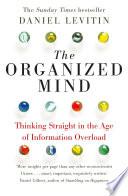Quotes from book
The Organized Mind

The Organized Mind: Thinking Straight in the Age of Information Overload is a bestselling popular science book written by the McGill University neuroscientist Daniel J. Levitin, PhD, and first published by Dutton Penguin in the United States and Canada in 2014. It is Levitin's 3rd consecutive best-seller, debuting at #2 on the New York Times Best Seller List, #1 on the Canadian best-seller lists, #1 on Amazon, and #5 on The London Times bestseller list.

“Fondness for stories is just one of many artifacts, side effects of the way our brains work.”
The Organized Mind (2014)

“Memory is fallible… not because of storage limitations so much as retrieval limitations.”
The Organized Mind (2014)

The Organized Mind (2014)
Context: Former secretary of state George Shultz, reflecting on forty years of United States foreign policy from 1970 to the present, said, “When I think about all the money we spent on bombs and munitions, and our failures in Viet Nam, Iraq, Afghanistan and other places around the world... Instead of advancing our agenda using force, we should have instead built schools and hospitals in these countries, improving the lives of their children. By now, those children would have grown into positions of influence, and they would be grateful to us instead of hating us.

“You’d think people would realize they’re bad at multitasking”
The Organized Mind (2014)
Context: You’d think people would realize they’re bad at multitasking and would quit. But a cognitive illusion sets in, fueled in part by a dopamine-adrenaline feedback loop, in which multitaskers think they are doing great.

“Most of us have adopted a strategy to get along called satisficing,”
The Organized Mind (2014)
Context: Most of us have adopted a strategy to get along called satisficing, a term coined by... Herbert Simon... to describe not getting the very best option but one that was good enough.... Satisficing is one of the foundations of productive human behavior... we don't waste time trying to find improvements that are not going to make a significant difference in our happiness or satisfaction.

“The most fundamental principle of the organized mind”
The Organized Mind (2014)
Context: The most fundamental principle of the organized mind, the one most critical to keeping us from forgetting or losing things, is to shift the burden of organizing from our brains to the external world.